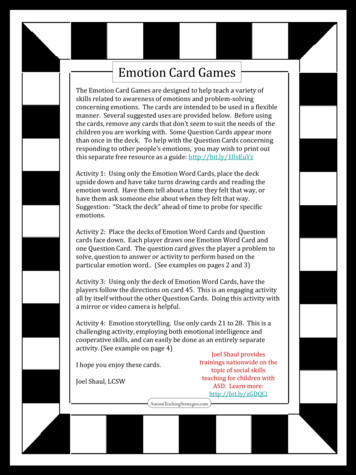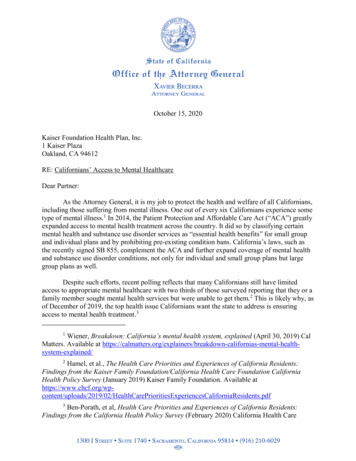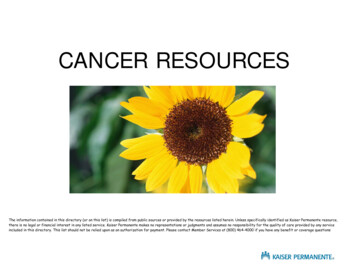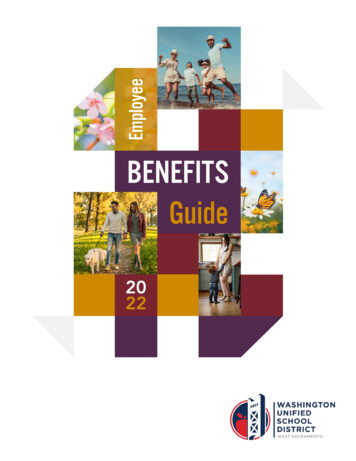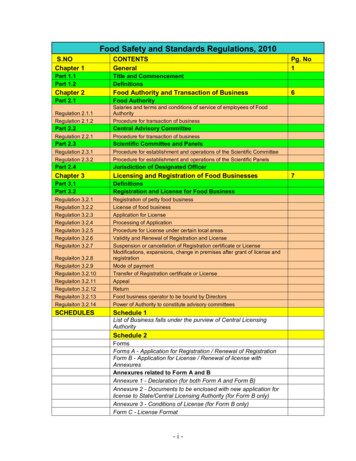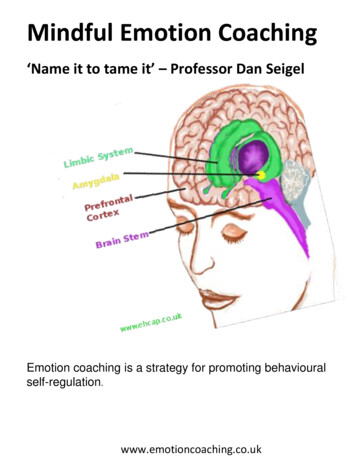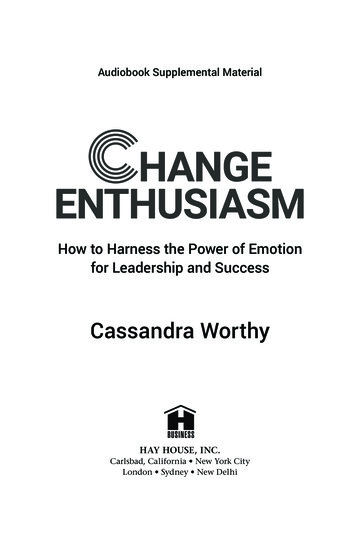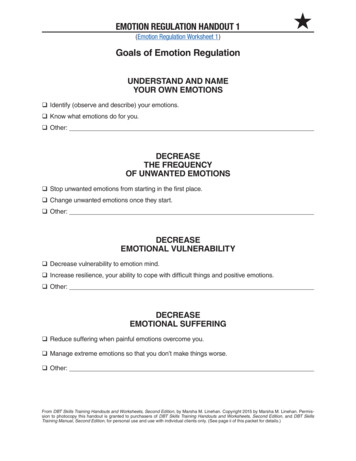
Transcription
EMOTION REGULATION HANDOUT 1(Emotion Regulation Worksheet 1)1 72.p;Goals of Emotion RegulationUNDERSTAND AND NAMEYOUR OWN EMOTIONSIdentify (observe and describe) your emotions.Know what emotions do for you.Other:DECREASETHE FREQUENCYOF UNWANTED EMOTIONSStop unwanted emotions from starting in the first place.Change unwanted emotions once they start.Other:DECREASEEMOTIONAL VULNERABILITYDecrease vulnerability to emotion mind.Increase resilience, your ability to cope with difficult things and positive emotions.Other:DECREASEEMOTIONAL SUFFERINGReduce suffering when painful emotions overcome you.Manage extreme emotions so that you don’t make things worse.Other:From DBT Skills Training Handouts and Worksheets, Second Edition, by Marsha M. Linehan. Copyright 2015 by Marsha M. Linehan. Permission to photocopy this handout is granted to purchasers of DBT Skills Training Handouts and Worksheets, Second Edition, and DBT SkillsTraining Manual, Second Edition, for personal use and use with individual clients only. (See page ii of this packet for details.)
EMOTION REGULATION HANDOUT 3(Emotion Regulation Worksheets 2–2c)872–572. pp;What Emotions Do for YouEMOTIONS MOTIVATE (AND ORGANIZE) US FOR ACTION Emotions motivate our behavior. Emotions prepare us for action.The action urge of specific emotions is often “hard-wired” in biology. Emotions save time in getting us to act in important situations.Emotions can be especially important when we don’t have time to think things through. Strong emotions help us overcome obstacles—in our minds and in the environment.EMOTIONS COMMUNICATE TO (AND INFLUENCE) OTHERS Facial expressions are hard-wired aspects of emotions.Facial expressions communicate faster than words. Our body language and voice tone can also be hard-wired.Like it or not, they also communicate our emotions to others. When it is important to communicate to others, or send them a message,it can be very hard to change our emotions. Whether we intend it or not, our communication of emotions influences others.EMOTIONS COMMUNICATE TO OURSELVES Emotional reactions can give us important information about a situation.Emotions can be signals or alarms that something is happening. Gut feelings can be like intuition—a response to something important about the situation.This can be helpful if our emotions get us to check out the facts. Caution: Sometimes we treat emotions as if they are facts about the world: The strongerthe emotion, the stronger our belief that the emotion is based on fact. (Examples: “If I feelunsure, I am incompetent,” “If I get lonely when left alone, I shouldn’t be left alone,” “If I feelconfident about something, it is right,” “If I’m afraid, there must be danger,” “I love him, sohe must be OK.”) If we assume that our emotions represent facts about the world, we may use them to justifyour thoughts or our actions. This can be trouble if our emotions get us to ignore the facts.From DBT Skills Training Handouts and Worksheets, Second Edition, by Marsha M. Linehan. Copyright 2015 by Marsha M. Linehan. Permission to photocopy this handout is granted to purchasers of DBT Skills Training Handouts and Worksheets, Second Edition, and DBT SkillsTraining Manual, Second Edition, for personal use and use with individual clients only. (See page ii of this packet for details.)
EMOTION REGULATION HANDOUT 4(Emotion Regulation Worksheets 3, 16 )213, 972. pp;What Makes It Hard to Regulate Your EmotionsIIIBIOLOGYBiological factors can make emotion regulation harder.LACK OF SKILLYou don’t know what to do to regulate your emotions.REINFORCEMENT OF EMOTIONAL BEHAVIORYour environment reinforces you when you are highly emotional.IIIMOODINESSYour current mood controls what you do instead of your Wise Mind.You don’t really want to put in time and effort to regulate your emotions.EMOTIONAL OVERLOADHigh emotional arousal causes you to reach a skills breakdown point.You can’t follow skills instructions or figure out what to do.EMOTION MYTHSMyths (e.g., mistaken beliefs) about emotions get in the way of yourability to regulate emotions.Myths that emotions are bad or weak lead to avoiding emotions.Myths that extreme emotions are necessary or are part of who you arekeep you from trying to regulate your emotions.From DBT Skills Training Handouts and Worksheets, Second Edition, by Marsha M. Linehan. Copyright 2015 by Marsha M. Linehan. Permission to photocopy this handout is granted to purchasers of DBT Skills Training Handouts and Worksheets, Second Edition, and DBT SkillsTraining Manual, Second Edition, for personal use and use with individual clients only. (See page ii of this packet for details.)
EMOTION REGULATION HANDOUT 5(Emotion Regulation Worksheets 4, 4a)282–182. pp;Model for Describing EmotionsrIIII-IPreexistingVulnerability FactorsI- - - - - -. J -------.,,,,. --.,Interpretation/ (Thoughts/beliefsabout '' . prompting event) .,,,,. ----- :-.1. . ; . . .IAttention/AwarenessPrompting EventAttention/AwarenesstIBiological ChangesBrain changes(neural firing)ExpressionsNervous system changes(internal body changesthat affect musclesand autonomic systemfiring—blood vessels,heart rate, temperature)Face and Body Language(facial expression, posture,gestures, skin color)ExperiencesActions(your behavior)Prompting Event 2Body sensations (feelings)SecondaryEmotionsWords(what you say)EmotionNameAwarenessAction urgesAftereffectsFrom DBT Skills Training Handouts and Worksheets, Second Edition, by Marsha M. Linehan. Copyright 2015 by Marsha M. Linehan. Permission to photocopy this handout is granted to purchasers of DBT SkillsTraining Handouts and Worksheets, Second Edition, and DBT Skills Training Manual, Second Edition, for personal use and use with individual clients only. (See page ii of this packet for details.).
EMOTION REGULATION HANDOUT 6(p. 1 of 10)(Emotion Regulation Worksheets 4, 4a )282–182. pp;Ways to Describe ssexasperationferocityfrustrationANGER irritationoutrageragevengefulnesswrathPrompting Events for Feeling Anger Not having things turn out as expected. Having an important goal blocked. Physical or emotional pain. You or someone you care about being Other:attacked or threatened by others. Losing power, status, or respect. Interpretations of Events That Prompt Feelings of Anger Rigidly thinking, “I’m right.”Believing that you have been treated unfairly. Judging that the situation is illegitimate orBlaming.wrong.Believing that important goals are being Ruminating about the event that set off theblocked or stopped.anger in the first place.Believing that things “should” be different Other:than they are. Biological Changes and Experiences of Anger Being unable to stop tears.Muscles tightening. Wanting to hit someone, bang the wall, throwTeeth clamping together.something, blow up.Hands clenching. Wanting to hurt someone.Feeling your face flush or get hot. Other:Feeling like you are going to explode. Expressions and Actions of Anger Clenching your hands or fists.Physically or verbally attacking. Frowning, not smiling, mean expression.Making aggressive or threatening gestures. Brooding or withdrawing from others.Pounding, throwing things, breaking things. Crying.Walking heavily, stomping, slamming doors. Grinning.Walking out.Using a loud, quarrelsome, or sarcastic voice. A red or flushed face. Other:Using obscenities or swearing.Criticizing or complaining.Aftereffects of Anger Imagining future situations that will make you Narrowing of attention.angry. Attending only to the situation that’s making Depersonalization, dissociative experiences,you angry.numbness. Ruminating about the situation making you Other:angry or about situations in the past.(continued on next page)Note. Adapted from Table 3 in Shaver, P., Schwartz, J., Kirson, D., & O’Connor, C. (1987). Emotion knowledge: Further exploration of a prototype approach. Journal of Personality and Social Psychology, 52(6), 1061–1086. Copyright 1987 by the American Psychological Association.Adapted by permission.From DBT Skills Training Handouts and Worksheets, Second Edition, by Marsha M. Linehan. Copyright 2015 by Marsha M. Linehan. Permission to photocopy this handout is granted to purchasers of DBT Skills Training Handouts and Worksheets, Second Edition, and DBT SkillsTraining Manual, Second Edition, for personal use and use with individual clients only. (See page ii of this packet for details.)
EMOTION REGULATION HANDOUT 6disgustabhorrenceantipathy aversioncondescensioncontempt(p. 2 of 10)DISGUST kenedspitevilePrompting Events for Feeling Disgust Seeing blood; getting blood drawn.Seeing/smelling human or animal waste Observing or hearing about a person actingproducts.with extreme hypocrisy/fawning.Having a person or an animal that is dirty, Observing or hearing about betrayal, childslimy, or unclean come close to you.abuse, racism, or other types of cruelty.Tasting something or being forced to swallow Being forced to watch something that deeplysomething you really don’t want.violates your own Wise Mind values.Seeing or being near a dead body. Being confronted with someone who isTouching items worn or owned by a stranger,deeply violating your own Wise Mind values.dead person, or disliked person. Being forced to engage in or watch unwantedObserving or hearing about a person whosexual contact.grovels or who strips another person of Other:dignity.Interpretations of Events That Prompt Feelings of Disgustanother. Believing that: Extreme disapproval of yourself or your own You are swallowing something toxic.feelings, thoughts, or behaviors. Your skin or your mind is being Judging that a person is deeply immoral orcontaminated.has sinned or violated the natural order of Your own body or body parts are ugly.things. Others are evil or the “scum” of the earth, Judging someone’s body as extremely ugly.or that they disrespect authority or the Other:group. Disapproving of/feeling morally superior to Biological Changes and Experiences of Disgust Urge to take a shower.Feelings of nausea; sick feeling. Urge to run away or push away.Urge to vomit, vomiting, gagging, choking. Feeling contaminated, dirty, unclean.Having a lump in your throat. Feeling mentally polluted.Aversion to drinking or eating. Fainting.Intense urge to destroy or get rid of Other:something.Expressions and Actions of Disgust Physically attacking causes of your disgust.Vomiting, spitting out. Using obscenities or cursing.Closing your eyes, looking away. Clenching your hands or fists.Washing, scrubbing, taking a bath. Frowning, or not smiling.Changing your clothes; cleaning spaces. Mean or unpleasant facial expression.Avoiding eating or drinking. Speaking with a sarcastic voice tone.Pushing or kicking away; running away. Nose and top lip tightened up; smirking.Treating with disdain or disrespect. Other:Stepping over; crowding another person out.Aftereffects of Disgust Becoming hypersensitive to dirt. Narrowing of attention. Other: Ruminating about the situation that’s makingyou feel disgusted.(continued on next page)
EMOTION REGULATION HANDOUT ledENVY WORDSdispleaseddissatisfieddown-hearted(p. 3 of wishfulPrompting Events for Feeling Envy Others get something you really want and Someone has something you really want oryou don’t get it.need but don’t or can’t have. Being around people who have more than You are not part of the “in” crowd.you have. Someone appears to have everything. Someone you are competing with is more You are alone while others are having fun.successful than you in an area important to Someone else gets credit for what you’veyou.done. Other: Someone gets positive recognition forsomething and you don’t.Interpretations of Events That Prompt Feelings of Envymediocre in comparison to others whom you Thinking you deserve what others have.want to be like. Thinking others have more than you. Comparing yourself to others who have more Thinking about how unfair it is that you havethan you.such a bad lot in life compared to others. Comparing yourself to people who have Thinking you have been treated unfairly bycharacteristics that you wish you had.life. Thinking you are unappreciated. Thinking you are unlucky. Other: Thinking you are inferior, a failure, or Biological Changes and Experiences of Envy Wanting the person or people you envy toMuscles tightening.lose what they have, to have bad luck, or toTeeth clamping together, mouth tightening.be hurt.Feeling your face flush or get hot. Feeling pleasure when others experienceFeeling rigidity in your body.failure or lose what they have.Pain in the pit of the stomach. Feeling unhappy if another personHaving an urge to get even.experiences some good luck.Hating the other person. Feeling motivated to improve yourself.Wanting to hurt the people you envy. Other:Expressions and Actions of Envy Doing something to make the other person Doing everything you can to get what thefail or lose what he or she has.other person has. Saying mean things about the other person Working a lot harder than you were to getor making the person look bad to others.what you want. Trying to show the other person up, to look Trying to improve yourself and your situation.better than the other person. Taking away or ruining what the other person Avoiding persons who have what you want.has. Other: Attacking or criticizing the other person. Doing something to get even.Aftereffects of Envyappreciating things you have or things others Narrowing of attention.do for you. Attending only to what others have that you Ruminating about what you don’t have.don’t. Ruminating when others have had more than Making resolutions to change. Other:you. Discounting what you do have; not(continued on next page)
EMOTION REGULATION HANDOUT 6fearanxietyapprehensiondreadedginessfrightFEAR panic(p. 4 of 10)shocktensenessterroruneasinessworryPrompting Events for Feeling Fear Silence. Having your life, your health, or your well Being in a new or unfamiliar situation.being threatened. Being alone (e.g., walking alone, being home Being in the same situation (or a similar one)alone, living alone).where you have been threatened or gotten Being in the dark.hurt in the past, or where painful things have Being in crowds.happened. Leaving your home. Flashbacks. Having to perform in front of others. Being in situations where you have seen Pursuing your dreams.others threatened or be hurt. Other:Interpretations of Events That Prompt Feelings of Fear Believing that: Believing that: You will not get help you want or need. You might die, or you are going to die. You might lose help you already have. You might be hurt or harmed. You might lose someone important. You might lose something valuable. You might lose something you want. Someone might reject, criticize, or dislike You are helpless or are losing a sense ofyou.control. You will embarrass yourself. You are incompetent or are losing mastery. Failure is possible; expecting to fail. Other: Biological Changes and Experiences of Fear Feeling nauseated.Breathlessness. Getting cold; feeling clammy.Fast heartbeat. Feeling your hairs standing on end.Choking sensation, lump in throat. Feeling of “butterflies” in stomach.Muscles tensing, cramping. Wanting to run away or avoid things.Clenching teeth. Other:Urge to scream or call out. Expressions and Actions of Fear Talking yourself out of doing what you fear.Fleeing, running away. Freezing, or trying not to move.Running or walking hurriedly. Crying or whimpering.Hiding from or avoiding what you fear. Shaking, quivering, or trembling.Engaging in nervous, fearful talk. A shaky or trembling voice.Pleading or crying for help. Sweating or perspiring.Talking less or becoming speechless. Diarrhea, vomiting.Screaming or yelling. Hair erect.Darting eyes or quickly looking around. Other:Frozen stare. Aftereffects of Fear Imagining the possibility of more loss orNarrowing of attention.failure.Being hypervigilant to threat. Isolating yourself.Losing your ability to focus or becoming Ruminating about other threatening times.disoriented or dazed. Other:Losing control.(continued on next page)
EMOTION REGULATION HANDOUT 6(p. 5 of 10)HAPPINESS deelationgleerapturePrompting Events for Feeling Happiness Receiving a wonderful surprise.Reality exceeding your expectations.Getting what you want.Getting something you have worked hard foror worried about.Things turning out better than you thoughtthey would.Being successful at a task.Achieving a desirable outcome.Receiving esteem, respect, or praise. Receiving love, liking, or affection. Being accepted by others. Belonging somewhere or with someone or agroup. Being with or in contact with people who loveor like you. Having very pleasurable sensations. Doing things that create or bring to mindpleasurable sensations. Other:Interpretations of Events That Prompt Feelings of Happiness Interpreting joyful events just as they are, without adding or subtracting. Other:Biological Changes and Experiences of Happiness Feeling excited.Feeling physically energetic, active.Feeling like giggling or laughing.Feeling your face flush.Feeling calm all the way through. Urge to keep doing what is associated withhappiness. Feeling at peace. Feeling open or expansive. Other:Expressions and Actions of Happiness Smiling.Having a bright, glowing face.Being bouncy or bubbly.Communicating your good feelings.Sharing the feeling.Silliness. Hugging people.Jumping up and down.Saying positive things.Using an enthusiastic or excited voice.Being talkative or talking a lot.Other:Aftereffects of Happiness Being courteous or friendly to others. Doing nice things for other people. Having a positive outlook; seeing the brightside. Having a high threshold for worry orannoyance. Remembering and imagining other times youhave felt joyful. Expecting to feel joyful in the future. Other:(continued on next page)
EMOTION REGULATION HANDOUT fulJEALOUSY WORDSfear of losing someone/somethingpossessive(p. 6 of rompting Events for Feeling Jealous You are treated as unimportant by a person An important relationship is threatened or inyou want to be close to.danger of being lost. Your partner tells you that he or she desires A potential competitor pays attention tomore time alone.someone you love. Your partner appears to flirt with someone Someone:else. Is threatening to take away important things A person you are romantically involved within your life.looks at someone else. Goes out with the person you like. You find the person you love is having an Ignores you while talking to a friend ofaffair with someone else.yours. Other: Is more attractive, outgoing, or selfconfident than you.Interpretations of Events That Prompt Feelings of Jealousy Believing that: Believing that: You were cheated. Your partner does not care for you any No one cares about you.more. Your rival is possessive and competitive. You are nothing to your partner. Your rival is insecure. Your partner is going to leave you. Your rival is envious. Your partner is behaving inappropriately. Other: You don’t measure up to your peers. I deserve more than what you are receiving. Biological Changes and Experiences of JealousyBreathlessness. Feelings of rejection.Fast heartbeat. Needing to be in control.Choking sensation, lump in throat. Feeling helpless.Muscles tensing. Wanting to grasp or keep hold of what youTeeth clenching.have.Becoming suspicious of others. Wanting to push away or eliminate your rival.Having injured pride.Expressions and Actions of JealousyViolent behavior or threats of violence toward Interrogating the person; demandingaccounting of time or activities.the person threatening to take something Collecting evidence of wrongdoings.away. Clinging; enhanced dependency.Attempting to control the freedom of the Increased or excessive demonstrations ofperson you are afraid of losing.love.Verbal accusations of disloyalty or Other:unfaithfulness.Spying on the person.Aftereffects of Jealousy Being hypervigilant to threats to your Narrowing of attention.relationships. Seeing the worst in others. Becoming isolated or withdrawn. Being mistrustful across the board. Other:(continued on next page)
EMOTION REGULATION HANDOUT 6(p. 7 of 10)LOVE entalitysympathytendernesswarmthPrompting Events for Feeling Love A person: Offers or gives you something you want,need, or desire. Does things you want or need. Does things you particularly value oradmire. Feeling physically attracted to someone. Being with someone you have fun with. You spend a lot of time with a person. You share a special experience with aperson. You have exceptionally good communicationwith a person. Other:Interpretations of Events That Prompt Feelings of Love Believing that a person loves, needs, or appreciates you.Thinking that a person is physically attractive.Judging a person’s personality as wonderful, pleasing, or attractive.Believing that a person can be counted on, or will always be there for you.Other:Biological Changes and Experiences of Love When you are with or thinking aboutsomeone: Feeling excited and full of energy. Fast heartbeat. Feeling self-confident. Feeling invulnerable. Feeling happy, joyful, or exuberant. Feeling warm, trusting, and secure. Feeling relaxed and calm. Wanting the best for a person.Wanting to give things to a person.Wanting to see and spend time with a person.Wanting to spend your life with a person.Wanting physical closeness or sex.Wanting emotional closeness.Expressions and Actions of Love Saying “I love you.”Expressing positive feelings to a person.Eye contact, mutual gaze.Touching, petting, hugging, holding, cuddling.Sexual activity. Smiling. Sharing time and experiences with someone. Doing things that the other person wants orneeds. Other: Aftereffects of Love Remembering other people who have lovedOnly seeing a person’s positive side.you.Feeling forgetful or distracted; daydreaming. Remembering other positive events.Feeling openness and trust. Believing in yourself; believing you areFeeling “alive,” capable.wonderful, capable, competent.Remembering other people you have loved. Other:(continued on next page)
EMOTION REGULATION HANDOUT icknessneglectalienationdiscontentmentSADNESS hurtsorrowrejectiondefeatdistraught(p. 8 of ting Events for Feeling Sadness Losing something or someone irretrievably. The death of someone you love. Things not being what you expected orwanted. Things being worse than you expected. Being separated from someone you care for. Getting what you don’t want. Not getting what you have worked for. Not getting what you believe you need in life. Being rejected, disapproved of, or excluded. Discovering that you are powerless orhelpless. Being with someone else who is sad or inpain. Reading or hearing about other people’sproblems or troubles in the world. Being alone, or feeling isolated or like anoutsider. Thinking about everything you have notgotten. Thinking about your losses. Thinking about missing someone. Other:Interpretations of Events That Prompt Feelings of Sadness Believing that a separation from someone willlast for a long time or will never end. Believing that you will not get what you wantor need in your life. Seeing things or your life as hopeless. Believing that you are worthless or notvaluable. Other:Biological Changes and Experiences of Sadness Feeling tired, run down, or low in energy. Feeling lethargic, listless; wanting to stay inbed all day. Feeling as if nothing is pleasurable any more. Pain or hollowness in your chest or gut. Feeling empty. Feeling as if you can’t stop crying, or if you ever start crying you will never be able tostop.Difficulty ons and Actions of Sadness Avoiding things. Acting helpless; staying in bed; beinginactive. Moping, brooding, or acting moody. Making slow, shuffling movements. Withdrawing from social contact. Avoiding activities that used to bring pleasure. Giving up and no longer trying to improve. Saying sad things.Talking little or not at all.Using a quiet, slow, or monotonous voice.Eyes drooping.Frowning, not smiling.Posture slumping.Sobbing, crying, whimpering.Other:Aftereffects of Sadness Ruminating about sad events in the past.Not being able to remember happy things. Insomnia.Feeling irritable, touchy, or grouchy. Appetite disturbance, indigestion.Yearning and searching for the thing lost. Other:Having a negative outlook.Blaming or criticizing yourself.(continued on next page)
EMOTION REGULATION HANDOUT 6shamecontrition culpabilitydiscomposureSHAME WORDSembarrassmenthumiliation(p. 9 of 10)mortificationself-consciousshynessPrompting Events for Feeling Shame Being reminded of something wrong,Being rejected by people you care about.immoral, or “shameful” you did in the past.Having others find out that you have done Being rejected or criticized for something yousomething wrong.expected praise for.Doing (or feeling or thinking) something Having emotions/experiences that have beenthat people you admire believe is wrong orinvalidated.immoral. Exposure of a very private aspect of yourselfComparing some aspect of yourself or youror your life.behavior to a standard and feeling as if you Exposure of a physical characteristic youdo not live up to that standard.dislike.Being betrayed by a person you love. Failing at something you feel you are (orBeing laughed at/made fun of.should be) competent to do.Being criticized in public/in front of someone Other:else; remembering public criticism.Others attacking your integrity.Interpretations of Events That Prompt Feelings of Shame Thinking that you are a bad person or aBelieving that others will reject you (or havefailure.rejected you). Believing your body (or a body part) is tooJudging yourself to be inferior, not “goodbig, too small, or ugly.enough,” not as good as others; self Thinking that you have not lived up to others’invalidation.expectations of you.Comparing yourself to others and thinking Thinking that your behavior, thoughts, orthat you are a “loser.”feelings are silly or stupid.Believing yourself unlovable.Thinking that you are bad, immoral, or wrong. Other:Thinking that you are defective.Biological Changes and Experiences of Shame Wanting to hide or cover your face and body. Pain in the pit of the stomach. Other: Sense of dread. Wanting to shrink down and/or disappear. Expressions and Actions of ShameHiding behavior or a characteristic from other Appeasing; saying you are sorry over andover and over.people. Looking down and away from others.Avoiding the person you have harmed. Sinking back; slumped and rigid posture.Avoiding persons who have criticized you. Halting speech; lowered volume while talking.Avoiding yourself— distracting, ignoring. Other:Withdrawing; covering the face.Bowing your head, groveling.Aftereffects of Shamenumbness, or shock.Avoiding thinking about your transgression; Attacking or blaming others.shutting down; blocking all emotions. Conflicts with other people.Engaging in distracting, impulsive behaviors Isolation, feeling alienated.to divert your mind or attention. Impairment in problem-solving ability.High amount of “self-focus”; preoccupation Other:with yourself.(continued on next page)Depersonalization, dissociative experiences,
EMOTION REGULATION HANDOUT 6(p. 10 of 10)GUILT rompting Events for Feeling Guilt Doing or thinking something you believe iswrong. Doing or thinking something that violates yourpersonal values. Not doing something you said that you woulddo. Committing a transgression against anotherperson or something you value. Causing harm/damage to another person orobject. Causing harm/damage to yourself. Being reminded of something wrong you didin the past. Other:Interpretations of Events That Prompt Feelings of Guilt Thinking that your actions are to blame forsomething. Thinking that you behaved badly. Thinking, “If only I had done somethingdifferently . . . ” Other:Biological Changes and Experiences of Guilt Hot, red face. Jitteriness, nervousness. Suffocating. Other:Expressions and Actions of Guilt Trying to repair the harm, make amends for the wrongdoing, fix the damage, change theoutcome. Asking for forgiveness, apologizing, confessing. Giving gifts/making sacrifices to try to make up for the transgression. Bowing your head; kneeling before the person.Aftereffects of Guilt Making resolutions to change.Making changes in behavior.Joining self-help programs.Other:Other Important Emotion Words Weariness, dissatisfaction, disinclin
Emotion Regulation Worksheets 2–2c) What Emotions Do for You . EMOTIONS MOTIVATE (AND ORGANIZE) US FOR ACTION Emotions motivate our behavior. Emotions prepare us for action. The action urge of specific emotions is often “hard-wired” in biology. Emotions sa
